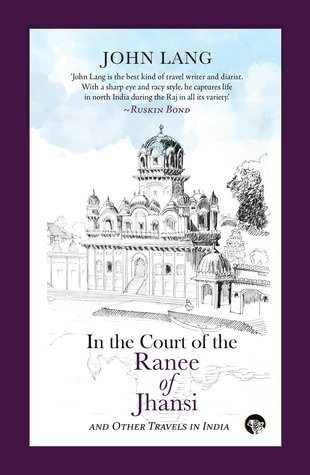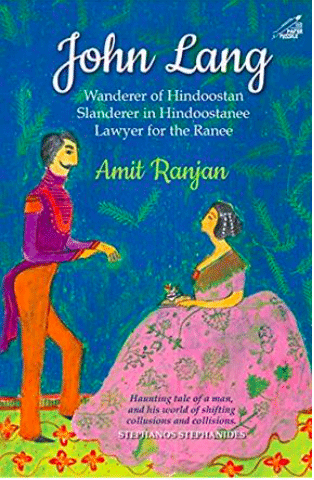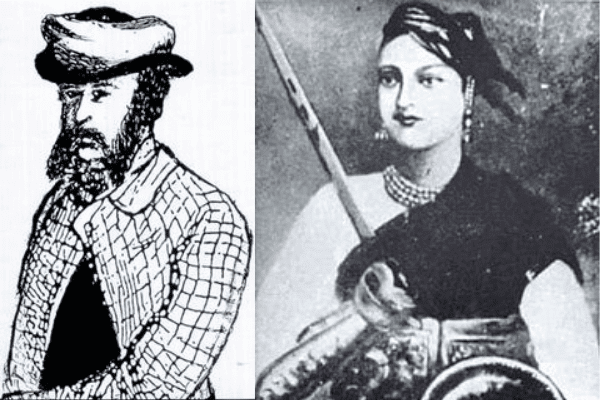John Lang, In the Court of the Ranee of Jhansi and Other Travels in India, Speaking Tiger, 2015; Rupa Publications 2016. Har-Anand publications 2015; Book on demand, US, 2013.
John Lang (1816-64) was a Sydney born writer, lawyer and journalist who lived most of his adult life in India. Growing up, he was a larrikin who had once been expelled from law school, and when his law practice in Sydney was not going great, he was advised to go to India where his brother-in-law Peterson was an established lawyer in Calcutta. So, Lang arrived aboard the ship Nabob in Calcutta in 1842 with his wife and two children.
However, not finding Calcutta to his taste, he moved later to “Umballa”, Meerut and Agra. At Meerut, Lang would start a newspaper called “The Mofussilite.” Mofussilite, or small towner, was not just the name of the newspaper, but Lang’s identity as well. He would often use “Mofussilite” as his pseudonym, and self-fashioned himself a small-towner, building things for himself rather than aligning with the powers-that-be of the East India Company. In fact, one can safely say that Lang was an anti-colonialist, with his constant lampoons, and his missives often trained at the East India Company. He was a prolific writer, journalist, and lawyer. As a lawyer, John Lang learnt Persian and Urdu to be able to argue cases in lower courts. He fought and won some important cases for Indians against the Company and represented Rani Laxmibai in her legal battle against to stop the annexation of her kingdom [Jhansi] under the infamous Doctrine of Lapse. Lang never left India; he died 22 years later in 1864.

Lang is buried in Mussoorie. Indeed, it was the writer Ruskin Bond who discovered this maverick Australian’s grave in Mussoorie, which led him to Lang’s writings, originally published in 1861 as Wanderings in India and Other Sketches of Life in Hindostan. Bond and Rupa Publications joined hands to republish them in 2016 – for which Bond also wrote an introduction. The articles in the book have been taken from Lang’s contributions to the weekly magazine Household Words, and include a series of ‘sketches of life in Hindostan’ through Lang’s lens during his travels in the sub-continent spanning the years from the 1840s until after the 1857 Sepoy Mutiny. Whether it is a description of the Himalayan foothills, or his insightful accounts of his interactions with well-known personalities, Lang’s book is insightful and remarkable.
What is evident from Lang’s writings is that he was a friend of India, its people and culture at a time when this was hardly a fashionable thing to be among white colonial gentlemen. Wanderings in India is one of the best and most engaging personal accounts of India in the nineteenth century.
As Lang was a Sydney-born man who had made India his home, Prime Minister Narendra Modi endorsed him as the first cultural ambassador of Australia to India. During his 2014 visit here, Modi gifted Tony Abbott, the Australian prime minister at that time, with documents related to John Lang, and tweeted about it too.
The book can be downloaded for free here.
READ ALSO: From an Indian Palace to the Outback: The Last Prince of Bengal (Review)

Amit Ranjan, John Lang:Wanderer of Hindoostan, Slanderer of Hindoostanee and Lawyer for the Ranee. Niyogi Books, July 2021. 472 pages
Amit Ranjan’s biography of John Lang, released recently on Live History India, is a wonderful recounting of this larrikin’s life. Ranjan has dug a bit deeper into Lang’s life and times, and tells us that he ended up being Rani Laxmibai’s lawyer on account of the fact that he had successfully fought the case of Lala Jotee Persaud against the East India Company in 1851. He had managed to secure Rs 50 lakhs for his client [a princely sum then] and a handsome amount for himself. This had made him famous among Indians as the lawyer who had defeated John Company, and this prompted the Rani of Jhansi to engage him. Ranjan is of the opinion that it was perhaps a wrong move on her part – as the British had already sued him for libel in the same Jotee Persaud case, and jailed him. They were, therefore, determined to cut him down to size – so his petition on behalf of the Rani was very quickly dismissed.
Having written a thesis on John Lang, Amit Ranjan has mined some rich primary archival material to bring us this delightful retelling of Lang’s life. He was a Visiting Fellow in the UNSW, Sydney, some years ago, and now teaches English at NCERT, Delhi. His next book is on Dara Shikoh.
*M. L. Augustine, Fort William Calcutta’s Crowning Glory: Calcutta’s Crowning Glory, Ocean Books Private Ltd, 1999.
READ ALSO: Untold stories from the Raj era
Link up with us!
Indian Link News website: Save our website as a bookmark
Indian Link E-Newsletter: Subscribe to our weekly e-newsletter
Indian Link Newspaper: Click here to read our e-paper
Indian Link app: Download our app from Apple’s App Store or Google Play and subscribe to the alerts
Facebook: facebook.com/IndianLinkAustralia
Twitter: @indian_link
Instagram: @indianlink
LinkedIn: linkedin.com/IndianLinkMediaGroup




